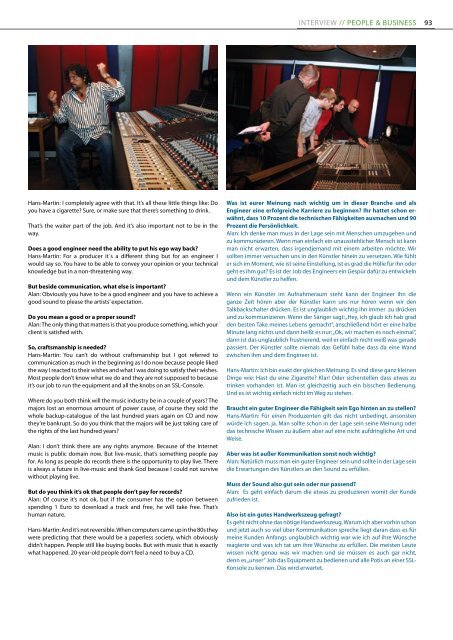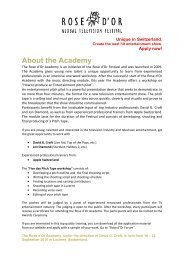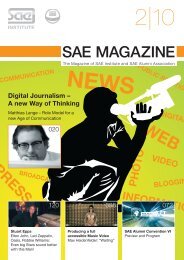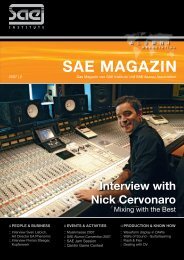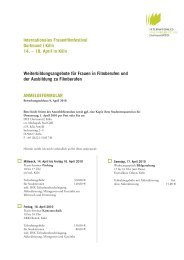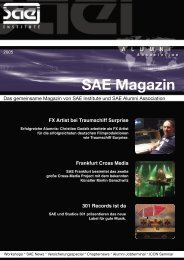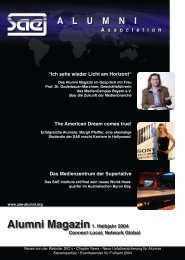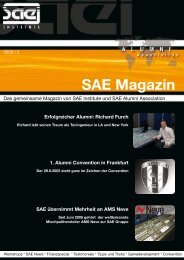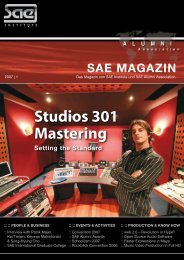SAE MAGAZINE - SAE Alumni Association - SAE Institute
SAE MAGAZINE - SAE Alumni Association - SAE Institute
SAE MAGAZINE - SAE Alumni Association - SAE Institute
Create successful ePaper yourself
Turn your PDF publications into a flip-book with our unique Google optimized e-Paper software.
Hans-Martin: I completely agree with that. It’s all these little things like: Do<br />
you have a cigarette? Sure, or make sure that there’s something to drink.<br />
That’s the waiter part of the job. And it’s also important not to be in the<br />
way.<br />
Does a good engineer need the ability to put his ego way back?<br />
Hans-Martin: For a producer it´s a different thing but for an engineer I<br />
would say so. you have to be able to convey your opinion or your technical<br />
knowledge but in a non-threatening way.<br />
But beside communication, what else is important?<br />
Alan: Obviously you have to be a good engineer and you have to achieve a<br />
good sound to please the artists’ expectation.<br />
Do you mean a good or a proper sound?<br />
Alan: The only thing that matters is that you produce something, which your<br />
client is satisfied with.<br />
So, craftsmanship is needed?<br />
Hans-Martin: you can’t do without craftsmanship but I got referred to<br />
communication as much in the beginning as I do now because people liked<br />
the way I reacted to their wishes and what I was doing to satisfy their wishes.<br />
Most people don’t know what we do and they are not supposed to because<br />
it’s our job to run the equipment and all the knobs on an SSL-Console.<br />
Where do you both think will the music industry be in a couple of years? The<br />
majors lost an enormous amount of power cause, of course they sold the<br />
whole backup-catalogue of the last hundred years again on CD and now<br />
they’re bankrupt. So do you think that the majors will be just taking care of<br />
the rights of the last hundred years?<br />
Alan: I don’t think there are any rights anymore. Because of the Internet<br />
music is public domain now. But live-music, that’s something people pay<br />
for. As long as people do records there is the opportunity to play live. There<br />
is always a future in live-music and thank God because I could not survive<br />
without playing live.<br />
But do you think it’s ok that people don’t pay for records?<br />
Alan: Of course it’s not ok, but if the consumer has the option between<br />
spending 1 Euro to download a track and free, he will take free. That’s<br />
human nature.<br />
Hans-Martin: And it’s not reversible. When computers came up in the 80s they<br />
were predicting that there would be a paperless society, which obviously<br />
didn’t happen. People still like buying books. But with music that is exactly<br />
what happened. 20-year-old people don’t feel a need to buy a CD.<br />
interview // PeoPle & BUsiness 93<br />
Was ist eurer Meinung nach wichtig um in dieser Branche und als<br />
Engineer eine erfolgreiche Karriere zu beginnen? Ihr hattet schon erwähnt,<br />
dass 10 Prozent die technischen Fähigkeiten ausmachen und 90<br />
Prozent die Persönlichkeit.<br />
Alan: Ich denke man muss in der Lage sein mit Menschen umzugehen und<br />
zu kommunizieren. Wenn man einfach ein unausstehlicher Mensch ist kann<br />
man nicht erwarten, dass irgendjemand mit einem arbeiten möchte. Wir<br />
sollten immer versuchen uns in den Künstler hinein zu versetzen. Wie fühlt<br />
er sich im Moment, wie ist seine Einstellung, ist es grad die Hölle für ihn oder<br />
geht es ihm gut? Es ist der Job des Engineers ein Gespür dafür zu entwickeln<br />
und dem Künstler zu helfen.<br />
Wenn ein Künstler im Aufnahmeraum steht kann der Engineer ihn die<br />
ganze Zeit hören aber der Künstler kann uns nur hören wenn wir den<br />
Talkbackschalter drücken. Es ist unglaublich wichtig ihn immer zu drücken<br />
und zu kommunizieren. Wenn der Sänger sagt: „Hey, ich glaub ich hab grad<br />
den besten Take meines Lebens gemacht“, anschließend hört er eine halbe<br />
Minute lang nichts und dann heißt es nur: „Ok, wir machen es noch einmal“,<br />
dann ist das unglaublich frustrierend, weil er einfach nicht weiß was gerade<br />
passiert. Der Künstler sollte niemals das Gefühl habe dass da eine Wand<br />
zwischen ihm und dem Engineer ist.<br />
Hans-Martin: Ich bin exakt der gleichen Meinung. Es sind diese ganz kleinen<br />
Dinge wie: Hast du eine Zigarette? Klar! Oder sicherstellen dass etwas zu<br />
trinken vorhanden ist. Man ist gleichzeitig auch ein bisschen Bedienung.<br />
Und es ist wichtig einfach nicht im Weg zu stehen.<br />
Braucht ein guter Engineer die Fähigkeit sein Ego hinten an zu stellen?<br />
Hans-Martin: Für einen Produzenten gilt das nicht unbedingt, ansonsten<br />
würde ich sagen, ja. Man sollte schon in der Lage sein seine Meinung oder<br />
das technische Wissen zu äußern aber auf eine nicht aufdringliche Art und<br />
Weise.<br />
Aber was ist außer Kommunikation sonst noch wichtig?<br />
Alan: Natürlich muss man ein guter Engineer sein und sollte in der Lage sein<br />
die Erwartungen des Künstlers an den Sound zu erfüllen.<br />
Muss der Sound also gut sein oder nur passend?<br />
Alan: Es geht einfach darum die etwas zu produzieren womit der Kunde<br />
zufrieden ist.<br />
Also ist ein gutes Handwerkszeug gefragt?<br />
Es geht nicht ohne das nötige Handwerkszeug. Warum ich aber vorhin schon<br />
und jetzt auch so viel über Kommunikation spreche liegt daran dass es für<br />
meine Kunden Anfangs unglaublich wichtig war wie ich auf ihre Wünsche<br />
reagierte und was ich tat um ihre Wünsche zu erfüllen. Die meisten Leute<br />
wissen nicht genau was wir machen und sie müssen es auch gar nicht,<br />
denn es „unser“ Job das Equipment zu bedienen und alle Potis an einer SSL-<br />
Konsole zu kennen. Das wird erwartet.


